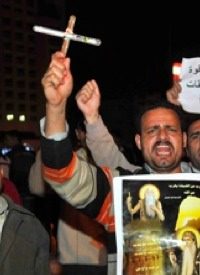
The most recent clash between Christians and Muslims came in the aftermath of Muslims burning a church in the village of Soul; fighting erupted in the suburbs of Cairo, resulting in 11 dead and 140 wounded. Muslims allegedly burned the church because of a relationship between a Coptic man and a Muslim woman; when Christians attempted to peacefully protest the burning of a church, they were set upon by a Muslim mob.
The burning of the Church of St. Mina and St. George is just one of the latest brutal acts of persecution which have confronted Copts this year. In the weeks just prior to the beginning of the protests that would eventually drive President Hosni Mubarak from power, the world briefly turned its attention to the problem of anti-Coptic persecution when a car bomb exploded outside a church in Alexandria, killing over 20 people and injuring nearly 80 others. Although the Coptic Church is not in communion with the Roman Catholic Church, Pope Benedict was among the Christian leaders who urged the Egyptian government to take further steps to protect its Christian minority. The Mubarak government responded to Benedict’s appeal by withdrawing its ambassador to the Vatican.
The burning of the Church of St. Mina and St. George sparked a reaction in Cairo; as The New York Times reports,
Military prosecutors began investigating the clashes on Wednesday, security sources said, questioning 15 people on charges of carrying guns and damaging cars and other property. The clashes began after demonstrators demanded that the transitional government rebuild the burned church, bring the perpetrators to justice and publicly pledge to improve the condition of Egypt’s Christians. The neighborhood where the clashes erupted is home to many of the so-called zabaleen, the city’s impoverished mostly Christian garbage collectors, who ply their trade on donkey carts or [in] tiny mechanized trucks.
Several thousand Christians have demonstrated in front of Egypt’s state television headquarters for the past three days to voice similar demands.
Coptic Christians are used to having government officials turn a blind eye to their troubles; acts of persecution perpetrated against the minority faith in Egypt are rarely given the attention they deserve, and high profile attacks — such as the bombing of one church and the burning of another — are simply glaring reminders of the second-class status which Copts have in their own country.
According to an article for the Christian Science Monitor, the fighting erupted in Cairo when a peaceful protest by Christians blocked a roadway:
Not long after the demonstration began, Christian eyewitnesses say they were set upon by hundreds of Muslims who used Molotov cocktails, sticks, and knives to attack the rally. But residents of a nearby by Muslim neighborhood said the Christians struck first.
Ashraf Ramzy, a Christian whose head was bandaged after the fighting, described being terrified because, he says, the Army did not intervene. Mr. Ramzy said the crowd pulled him from his vehicle, beat him, and set his car on fire.
"[Muslims] were standing behind the Army, and chanting ‘the Army and the people are one,’ ” a common chant during Egypt’s revolution, he said. “Are we not people?”
Under Islamic law, Christians do not enjoy equal rights with Muslims; thus, for example, a Muslim is not to be sentenced to death for killing a Christian. Even those Muslim-dominated nations which purport to be partly-secularized in terms of their law very rarely see equal justice meted out without regard for religion.
In the aftermath of the burning of the church in Soul, the 12,000 Christians living there are reportedly now under a curfew. A story at ContinentalNews.net explains that the violence in Soul erupted because of the relationship between a Coptic man and a Muslim woman:
A “reconciliation” meeting was arranged between the relevant Coptic and Muslim families, and together with the Muslim elders it was decided that Ashraf Iskander would have to leave the village because Muslims torched his house.
AINA said the Muslim woman’s father was killed by his cousin because he did not kill his daughter to preserve the family honor, which led the woman’s brother to avenge the death of his father by killing the cousin. The village Muslims blamed the Christians.
The Muslim mob attacked the church, exploding five or six gas cylinders inside the church, pulled down the cross and the domes and burnt everything inside.
Honor killings, church burnings, curfews, and the violent suppression of peaceful protests demonstrate that the “new” Egypt is shaping up very much like the “old.” Thus far, any benefits to the Christian minority which may result from the removal of Hosni Mubarak remain to be seen.
Photo of Coptic Christians protesting church burning in Egypt: AP Images



